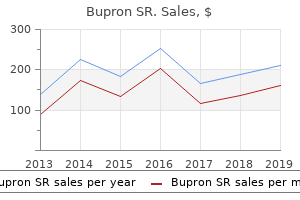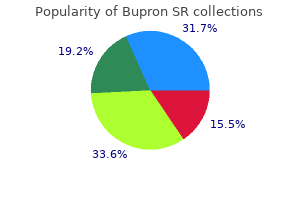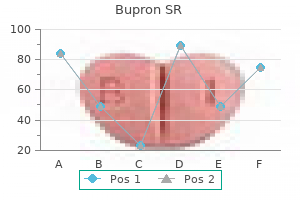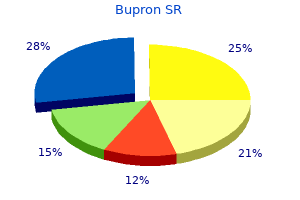Bupron SR
"Discount 150mg bupron sr with amex, anxiety 20 weeks pregnant".
By: S. Marus, M.B.A., M.D.
Deputy Director, Louisiana State University School of Medicine in New Orleans
Children are not passive recipients of parenting or schooling anxiety lightheadedness purchase bupron sr 150mg online, but active participants in every aspect of their own development mood disorder drugs list order generic bupron sr online. From birth mood disorder with anxiety purchase bupron sr pills in toronto, their brains are prepared to seek out and make use of experiences that suit their individual needs and preferences mood disorder jesse jackson purchase bupron sr canada. For this reason, brain development requires no special equipment or training, and most children find a way to grow in whatever conditions the world has to offer them. Things can go wrong if the genetic program has a flaw or if environmental conditions are very difficult, as happens in poverty or war. Brain development can get into trouble when our modified environment fails to play nicely with our ancient genetic heritage. In particular, we talk about how innate predispositions for how to interact with the outside world initiate a two-way conversation between genes and environment that shapes neural development throughout childhood. Part 2, Growing Through a Stage the brain goes through periods when it builds upon earlier foundations and is exceptionally sensitive to certain types of information. Part 4, the Serious Business of Play One of the major ways that children adapt to their circumstances is through play. In this section, we explore what play does for the brain and explain what animal research can teach us about its importance. Part 5, Your Child as an Individual Distinctive features of the genetic program make your baby a unique person from the start. Part 7, Bumps on the Road All environments present challenges to the developing brain. Most children can get what they need to grow, like dandelions, but a few are more 22 delicate flowers needing extra care or attention. Feel free to dip in anywhere that interests you, though you might want to start by reading the first two chapters. For generations, the slow development of motor systems led psychologists to believe that babies had very simple mental lives. In a baby that has not worked out how to walk or talk, mental capacities cannot be measured by approaches used to test grown-ups. But in the last few decades, scientists have figured out better ways of getting information from infants. All brains, young and old, have certain broad talents that help their owners to navigate life successfully. Although babies lack knowledge, they are born with certain tendencies that influence how they organize incoming information, and their responses to it. They are predisposed to seek out and make use of experiences that will help adapt their growing brains to their particular environment. For this reason, most brain development requires only a "good enough" environment (more on that later), which includes a reasonably competent (though not perfect) caretaker. Not long after that, she can turn her head and eyes to look at an interesting object or event. For example, if your infant likes an event that happened while she was sucking and wants it to happen again, she will suck more vigorously. Your newborn will suck harder when she hears a recording of her mother speaking, but less so when she hears another woman. After your baby has looked at something for a while, he will turn away and look at something more interesting. This response allows us to find out whether a baby can tell the difference between two things. For example, if you show your baby a series of pictures of cats, the appearance of a dog will attract a long look. This means that babies can distinguish cats from dogs-a feat that is extremely difficult to program into a computer. Simple tools like these have allowed researchers to identify five brain talents that infants already have well before their first birthday. The first talent is that babies can detect how common or rare particular events are. For example, a first step in learning a language is figuring out which syllables go together to form a word.
But the people who asked me to teach them meditation were usually 2 uninterested in the "spiritual" aspects mood disorder vs bipolar disorder order bupron sr canada. As chance would have it depression unemployment order bupron sr with mastercard, my own thoughts and practice were evolving along similar lines mood disorder nos dsm 4 best purchase bupron sr. While I loved (and still do) the spiritual depression symptoms extreme anger order genuine bupron sr on line, religious, and cultural practices around meditation, I found myself increasingly drawn to exploring the more psychological and neurological understandings of it, and the human brain in general. Starting around 2000, I became very interested in what neuroscience and evidence-based psychology had to say about meditative states and practices. I had the good fortune to work with Peter Baumann to develop the Being Human project,3 which put me in touch with some of the leading researchers in the field, such as Richie Davidson, Judson Brewer, David Eagleman, among many others; psychologists Paul Ekman and Helen Fisher, as well as philosophers such as Thomas Metzinger. That made it possible to share my knowledge with the Silicon Valley tech wizards I was meeting in the Bay Area and elsewhere. I now teach meditation at Google and some of the other largest corporations in the world. The arc of my own development, together with working at such places, as well as the influence of Shinzen, has led to the material in this book. I have dedicated the majority of my life to learning and practicing those ways, and I deeply honor them. The point of this book is to offer the practice of meditation to people who are turned off by that sort of thing, and so 3 would otherwise never take up meditation. If that sometimes means separating it from its religious and cultural contexts, so be it. The temples will still be standing, giving their colorful and fragrant offerings to those who wish to partake. In the meantime, for all the "thinkers, doers, and makers," out there, the mindful geeks, here is a book about meditation I wrote just for you. Can mindfulness meditation really deliver or is all this just some New Age marketing scam? I had fewer anxiety attacks, and I could cope much better with the ones that I did have. After that, I was hooked, and in the decades since then I have found that meditation has drastically improved my life. Thirdly, for thousands of years, people from different cultures on different continents with limited communication between each other all claimed that meditation practices changed their lives for the better. Finally, current brain science and psychology backs up many of these claims about meditation with some fairly robust findings. In the last decade in particular, the number of serious research studies involving mindfulness has skyrocketed. Part of the reason for this scientific interest is that so much of the research hits paydirt. Even a cursory summary of such research would take up a whole book, but here is just the briefest glance at a few of the benefits that are provably real. With guidance and a committed practice, over time, mindfulness meditation has been shown to: Improve Your Focus - Focus is a trainable skill, and meditation systematically trains you to concentrate. An important early study7 by neuroscientist Richard Davidson at the University of Wisconsin shows that meditation makes attentional resources much more flexible, which means you can concentrate more powerfully. When your hands are too shaky to guide yet another cup of coffee to your lips without spilling it, meditation is just what you need. Many of these studies are done in laboratory environments, but one fascinating study with human resources personnel in a high-stress, real-world environment showed that mindfulness meditation could even make very stressful situations easier to handle. An even more recent study12 (2014) showed that mindfulness was just as powerful as cognitive-behavioral therapy in treating anxiety and depression. Enhance Your Empathy - Mindfulness meditation will help you connect to other people. One practice is called compassion meditation, in which you focus on feelings of love and empathy. Experiments show that over time this can dramatically boost your empathy13 (sense of emotional connection) with others. Medical students under intense stress report higher levels of empathy14 when they meditate.


At last I walked weepily through the shopping malls to the Metro depression definition emedicine buy cheap bupron sr 150mg line, 29 Visiting Mrs Nabokov telling myself that there was no chance whatever mood disorder va disability rating 150 mg bupron sr with visa, no hope at all depression nutrition buy 150mg bupron sr with amex, of ever starting to unpick the dreamlike complexity of this depression ted talk buy generic bupron sr 150 mg line. New deployments have been combined with new negotia tions; America has rearmed so that she may disarm. Under Reagan, dual track has become a cruder matter of saying one thing while doing another. This among other things is what the Kremlin worst-casers fear; and in a worst case world, intentions and capabilities are indistinguishable. H u m a n l y, mora l l y, politically, militarily, they will all b e zero options. On the nuclear issue, as on so m a n y others, Ronald Reagan has deceived the American people. Now, owing to a world-historical fluke, we may get the first arms-reduction deal ever (but watch out for those Soviet violations). The prime mover is Oliver North, with the help of some pillow talk from Nancy, as she attempts to spruce up a tousled presidency for the history books. Such are the cosmic jokes, the astronomical cheap shots, that fashion our destiny in the nuclear age. After forty years of concerted thought, no one has got anywhere with nuclear weapons. No one has discovered what to do with them; no one has discovered how to do without them. The story of their management is a story of repetition, false summits, the retracing of steps. Nuclear technology changes, the procurements change, but the situa tion does not change. By a radiant paradox, public opinion has changed only that aspect of policy that directly concerns the public: it has killed off civil defence. Imagine nuclear weapons as sentient beings: there they are, preposterously savage, stupidly inert, yet not quite fearless. For they fear what they most threaten, ordinary 31 Visiting Mrs Nabokov people, people who have felt their mortal insult, people who have grasped a simple truth; that there is something wrong with the planet. He completed his classic study, the Wizards of Armageddon, at the age of twenty-eight. Four years later, his young face bears the orbits of care and strain; but these I partly attributed to his two-year-old twin daughters, who swayed and staggered around the lunch table as we ate. If you spend too much time with this subject, if you spend too much time in nothingland, you begin to feel marginal, spectral, insubstantial. And when I took my seat in the smoking section of the 747 at Dulles, I realised I was flying back just as I had flown i n; with extra sadness, bitter complexity, with extra nuke fa tigue - hut un· changed. However far you go into nuclea r weapons, there is no understanding to be had, only more knowledge. I n the h1te of the Earth, Jonathan Schell stressed the need for ohriety in the nuclear debate; the Pressed M a n must he c1vil to the Recruiter, despite the enticements of exaspera tion and anger. I have always assented to the j ustice of this tenet, while often 32 Nuclear City wondering why I find it so hard to abide by. This is a human story, and human pressures, human mobilisations, can be brought to bear upon it. The nuclear debate is a debate conducted with our fathers - but it is about our children. If the Recruiters are to be isolated and eventually pathologised - if the planet i s to grow up - then our children will have to act in self-defence. We must fix our kids so that they will have nothing to do with anyone who has anything to do with anyone who has anything to do with nuclear weapons, with instruments of blood and rubble. The process will begin at that moment of mortal shame when we acquaint them with the status quo, with the facts of life, the facts of death.


This works so well depression symptoms rage purchase bupron sr online from canada, that the hardest part is simply continuing once the 90 days is over mood disorder worksheets buy bupron sr uk. Sit with a Group - If you want to get the full benefit of social pressure depression symptoms of cancer discount bupron sr 150mg fast delivery, join a meditation group depression nursing definition order bupron sr 150mg visa. On top of the gain you get from consistency theory, you will also benefit from a major increase in your desire to meditate, due to the normative effects of peer pressure. I always say that "half of who you are is other people," meaning that the beliefs, attitudes, and biases of the people around you gradually become your own. By intentionally surrounding yourself with people who meditate, who believe that meditation is a good thing to do, who talk about the details of practice, and so forth, you are slowly and subtly reprogramming yourself to be a long term meditator. These trips were expensive-both in time and money- and required engineering my entire life around making such excursions possible. Long flights, uncomfortable travel, and intense dysentery-I experienced it all with almost a sense of joy, because I felt that it was part of my meditation journey, and therefore, meaningful to me. One time, however, after overcoming seemingly insurmountable obstacles, I finally arrived at a temple in rural Gujarat. I had practiced there before and felt that I had a pretty good understanding of what to expect. It would be dirty and uncomfortable, the food would either be unpalatable or almost non-existent, it would be impossible to sleep. There would be scorpions, bees, hundred-degree heat, interruptions, no hot water, and sometimes no water at all. I had come to love this village and its people, and figured that I would have a month of intensive meditation in blissful silence. This in a village where most homes were constructed of rough wood and mud with floors of smoothed cow dung, and almost no house had electricity or running water. Because they had gotten hooked up to the electricity grid, the temple rigged a microphone and ran in through a soundboard to some speakers. After all the money, the travel, the difficulties, I had just settled into my meditation spot, and was getting ready for a solid month of practice. With growing unease, I heard the sound system getting put into place, but was relieved that it was only an hour or two a day of them experimenting with it. I meditated as best I could during the other hours, and weathered the storm the rest of the time. The head priest of the temple somehow acquired an electronic keyboard; a Casiotone. This he played next to the microphone, broadcasting its squeaks and squawks through the monstrous sound system and out into the dusty Indian day. It seemed as though the whole village was agog over the sound system and the miraculous Casiotone, because they never stopped. Sequestered away in my meditation cell, however, each bleat from the keyboard was like a stab of pain in my guts. I just kept thinking of the wasted hours of my retreat, all of the wasted money and effort getting to India, the trek all the way out to this remote region to practice. It seemed that there was no way out of spending my entire retreat listening to an atonal cacophonous concert at ear-splitting volume. Giving diplomacy a try, I spoke to the head priest, who was surrounded by friends and admirers, all of whom were focused on the music. Having nothing else to do, and having made a commitment to practice, however, I just kept sitting there. It was still a terrible racket, like a hundred calliopes falling down a staircase, amplified through something you might find at a stadium rock concert. The moral of this story is the importance of cultivating acceptance in meditation practice. But there is another lesson, which is that it would have been very easy for me to have given up and gone home. In day-to-day meditating, these little things can grow big enough to frustrate even the most dedicated person. Work with a Meditation Coach - Sure, you can teach yourself to play the guitar or master your golf game. But complex, nuanced tasks like these are much easier to learn with the help of a qualified coach, and meditation is no exception. Once a Week, Consciously List the Goals and Benefits of Mediation Practice - Sometimes you will be having trouble getting motivated to sit down and meditate, and the question will suddenly pop into your head, "Why am I even doing this stupid practice in the first place?
Discount bupron sr 150mg online. Is depression and anxiety considered a mental illness ? | Health News and FAQ.

